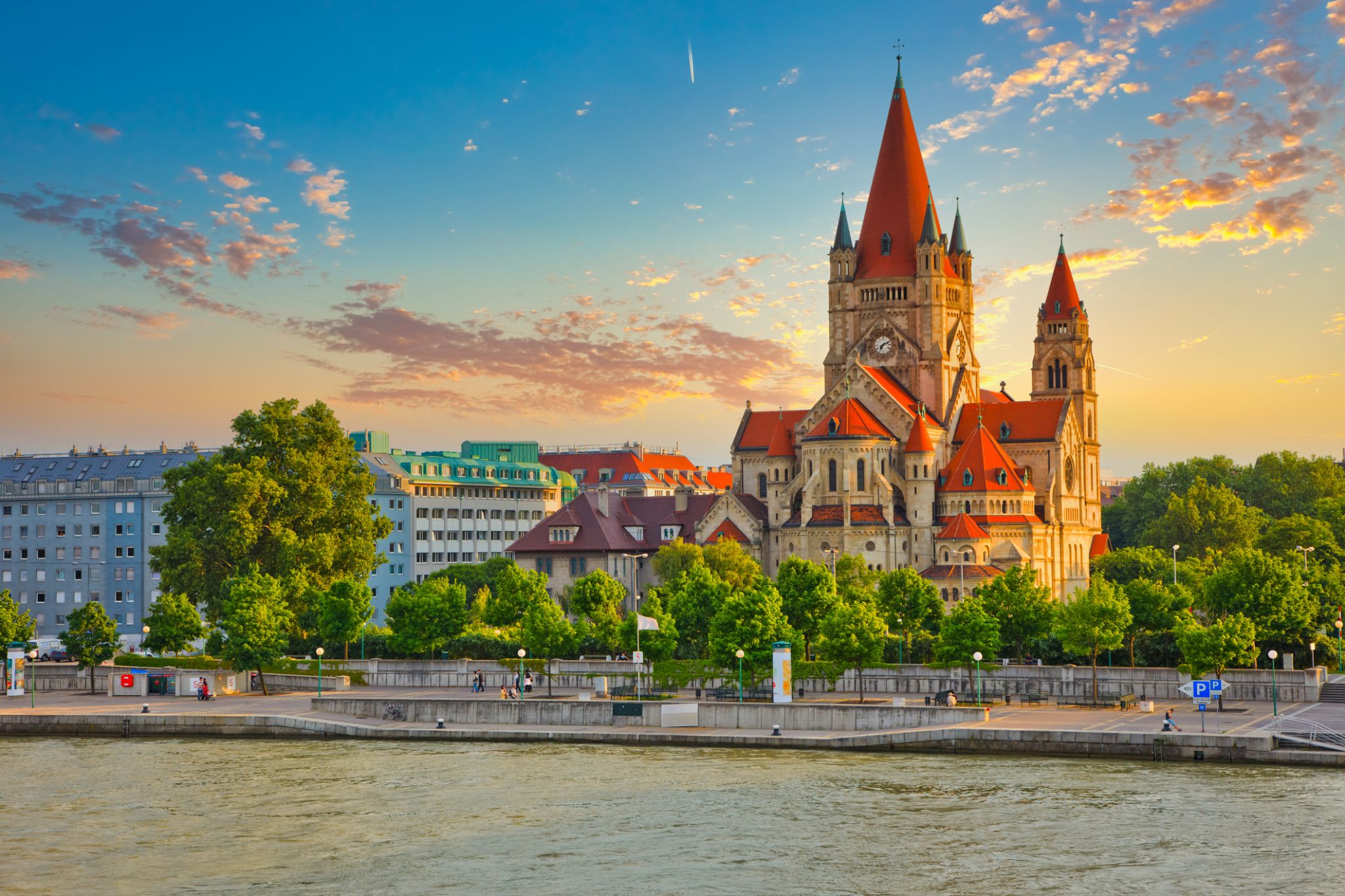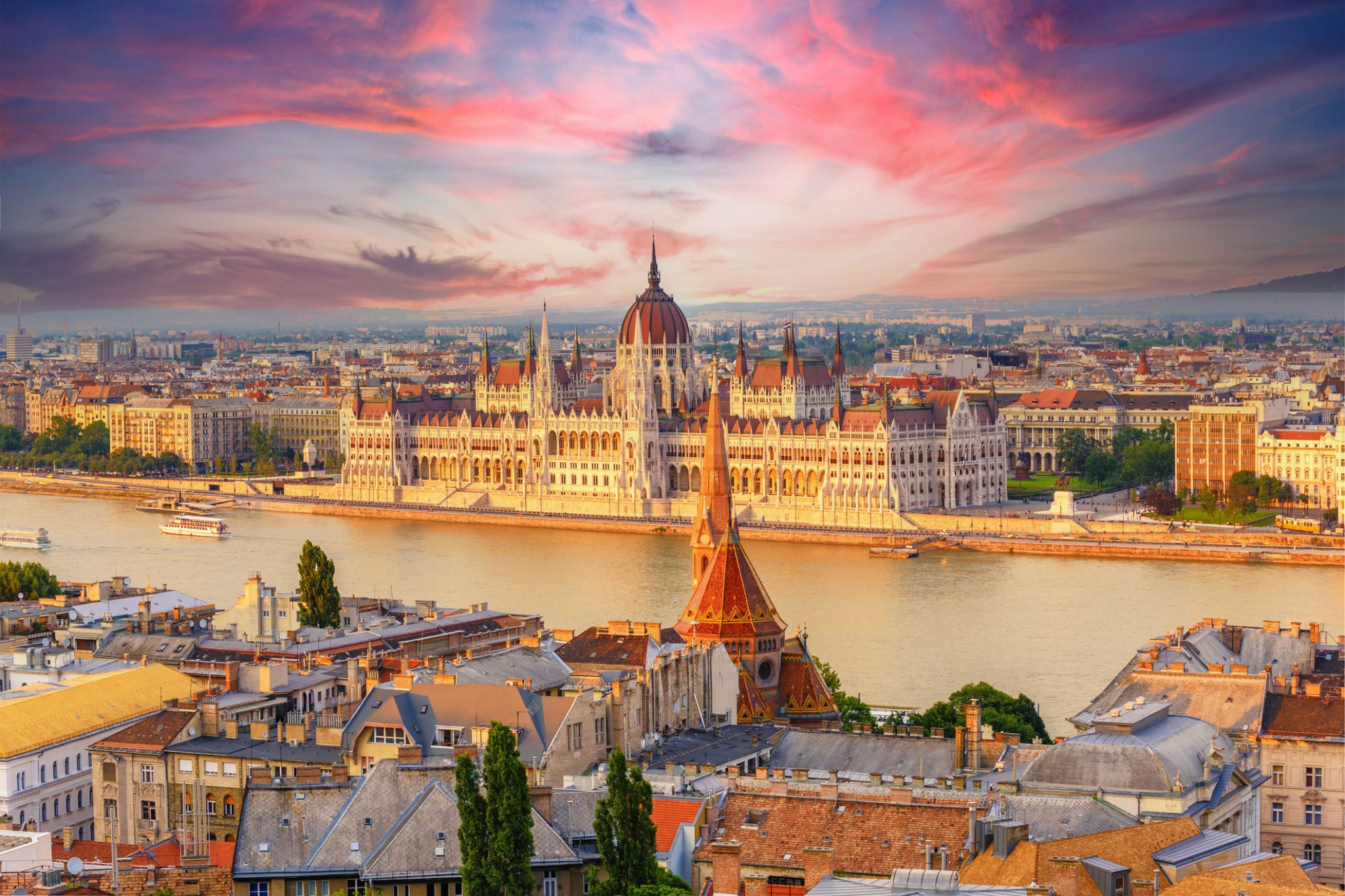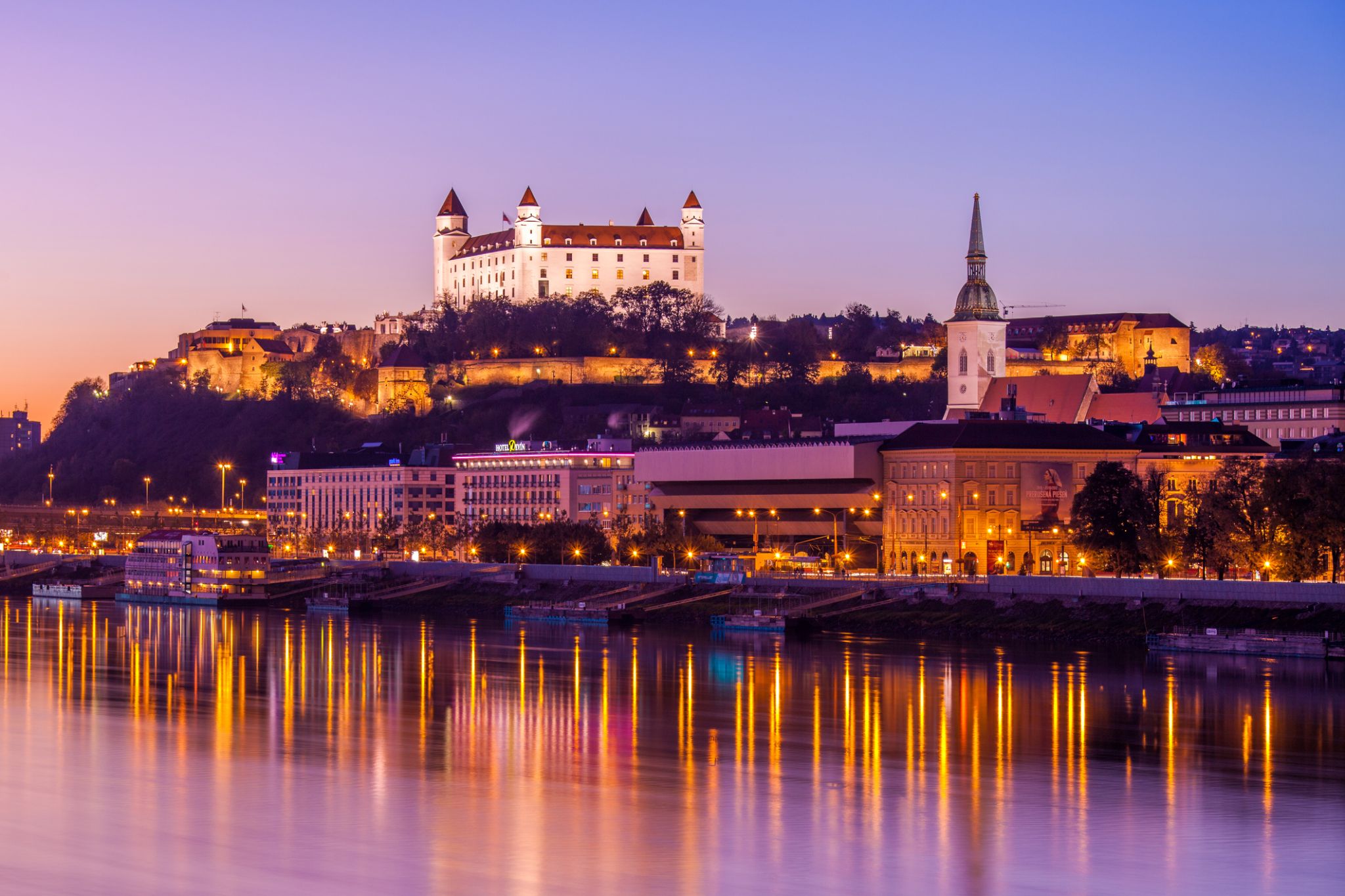

| Company : Croisi Europe |
| Ship : MS Vivaldi |
| Journey Start : Mon 22 Dec 2025 |
| Journey End : Sat 27 Dec 2025 |
| Count Nights : 5 nights |
| Day | Date | Port | Arrival | Departure |
|---|---|---|---|---|
| 1 | 22.12 Mon | Vienna / Austria | 18:00 | |
| 2 | 23.12 Tue | Vienna / Austria | ||
| 3 | 24.12 Wed | Vienna / Austria | 04:00 | |
| 3 | 24.12 Wed | Budapest / Hungary | 17:10 | |
| 4 | 25.12 Thu | Budapest / Hungary | 23:00 | |
| 5 | 26.12 Fri | Bratislava / Slovakia | 16:00 | 22:00 |
All inclusive on board:
All meals included - DRINKS INCLUDED with meals and at the bar
Refined French cuisine - Gala dinner and evening - Welcome cocktail
Free Wi-Fi onboard
Headsets are included for excursions
Official welcome from the captain and crew
Onboard activities
Travel assistance and repatriation insurance
All port fees included
Additional expenses:
Airfare and transfers to/from the departure and arrival ports
Personal expenses (e.g., souvenirs, extra drinks beyond those included)
Tips for crew and guides (recommended) from €9 per day per guest
Medical insurance (optional, at your own discretion)
Excursions and activities not included in the program
Additional onboard services (spa, massage, laundry, etc.)
PAYMENT AND BOOKING CONDITIONS:
A deposit 30 % is due within 4 days after confirmation if you pay credit card, bank transfer, or personal check. If you pay by credit card, you must sign an authorization form. If paying by wire transfer, the transfer must be received within 8 days after confirmation. Final payment is due at least 90 days prior to departure. Vouchers will be sent by email at 30 days prior to departure and only when full payment has been made. You are considered confirmed when we receive your deposit of 30 % of the price of the cruise, or, if you are confirmed within 90 days before departure, you are confirmed when we receive your full payment. Failure to pay the balance by the 90-day deadline is a default that entitles us to cancel your agreement and retain your deposit if you do not pay within eight days after notice of nonpayment.
CANCELLATION:
1) TRAVELLER’S RIGHT OF CANCELLATION
The traveller may cancel the contract at any time prior to the start of the trip or stay, subject to the payment of appropriate cancellation fees or, where applicable, standard cancellation fees charged by the organiser or retailer, in accordance with Article L. 211-14 I of the French Tourism Code.
2) CANCELLATION COSTS
In the event of cancellation by the customer, and in accordance with Article L 211-14 of the French Tourism Code, the sums paid will be reimbursed minus the cancellation fees per person specified below, depending on the date of cancellation in relation to the departure date, and the non-refundable costs of insurance, reservation fees and visa fees, as well as all other insurance and cancellation fees required by our suppliers. If one of the passengers in a double room or cabin cancels his/her reservation, the remaining passenger will have to pay the double room or cabin supplement for individual use. All cancellations must be sent to the seller by registered mail with acknowledgment of receipt..
Cost of cancelling CroisiEurope river cruises:
• More than 90 days before date of departure: 150 €, not including VAT, in administration fees will be charged per person (fees for themed-weekend and Christmas-market cruises are listed after)
• From 90 to 60 days: 20 % of total amount of cruise package
• From 59 to 30 days: 50 % of total amount of cruise package
• From 29 to 19 days: 60 % of total amount of cruise package
• From 18 to 9 days: 75 % of total amount of cruise package
• 8 days or less before departure: 100 % of total amount of cruise package
For CroisiEurope themed-weekend and Christmas-market river cruises, a cancellation fee of 50 €, not including VAT, will be charged per person at more than 90 days before departure. The fee schedule listed above remains unchanged for these cruises.
Cost of cancelling CroisiEurope seafaring cruises:
• More than 90 days before date of departure: 300 €, not including VAT, in administration fees will be charged per person
• From 90 to 60 days: 40 % of total amount of cruise package
• From 59 to 30 days: 60 % of total amount of cruise package
• From 29 to 9 days: 75 % of total amount of cruise package
• 8 days or less before departure: 100 % of total amount of cruise package
Cancellation terms and conditions above, the cancellation fees for CroisiEurope “New Year’s Eve” river and seafaring cruises are as follows:
• More than 90 days before date of departure: 300 €, not including
VAT, in administration fees will be charged per person
• From 90 to 60 days: 40 % of total amount of cruise package
• From 59 to 30 days: 60 % of total amount of cruise package
• From 29 to 20 days: 75 % of total amount of cruise package
• 19 days or less before departure: 100 % of total amount of cruise package
Cancellation fees for the cruises on the Mekong, Ganges, Nile and in Southern Africa:
• More than 90 days before date of departure: 300 €, not including VAT, in administration fees will be charged per person
• From 90 to 61 days: 35 % of total amount of cruise package
• From 60 to 31 days: 50 % of total amount of cruise package
• From 30 to 20 days: 70 % of total amount of cruise package
• From 19 to 9 days: 80 % of total amount of cruise package
• 8 days or less before departure: 100 % of total amount of cruise package
By accepting these general terms and conditions of sale, the traveller expressly acknowledges that he/she has been previously informed and agrees to the cancellation fees in the manner set out above.
IMPORTANT: All packages including air transport are subject to the general and specific cancellation conditions of the designated airline companies. In the event of cancellation by one or more passengers, the following cancellation conditions shall be applied:
• River, maritime and coastal services: pursuant to the general terms and conditions of CroisiEurope.
• Air transport: terms and conditions of the designated airline company, available on the web sites of the respective airlines or from our booking departments on request.
In addition, the amount of cancellation fees relating to land-based services (hotel, for example) will correspond to the amount of actual fees invoiced by the partner to CroisiEurope.

Vienna is the federal capital and largest city of Austria, and one of the nine states of Austria. Vienna is Austria's primate city, with a population of about 1.9 million (2.6 million within the metropolitan area, nearly one third of Austria's population), and its cultural, economic, and political centre. It is the 7th-largest city by population within city limits in the European Union. Until the beginning of the 20th century, it was the largest German-speaking city in the world, and before the splitting of the Austro-Hungarian Empire in World War I, the city had 2 million inhabitants. Today, it has the second largest number of German speakers after Berlin.Vienna is host to many major international organizations, including the United Nations and OPEC. The city is located in the eastern part of Austria and is close to the borders of the Czech Republic, Slovakia, and Hungary. These regions work together in a European Centrope border region. Along with nearby Bratislava, Vienna forms a metropolitan region with 3 million inhabitants. In 2001, the city centre was designated a UNESCO World Heritage Site. In July 2017 it was moved to the list of World Heritage in Danger.
Apart from being regarded as the City of Music[ because of its musical legacy, Vienna is also said to be "The City of Dreams" because it was home to the world's first psychoanalyst – Sigmund Freud. The city's roots lie in early Celticand Roman settlements that transformed into a Medieval and Baroque city, and then the capital of the Austro-Hungarian Empire. It is well known for having played an essential role as a leading European music centre, from the great age of Viennese Classicism through the early part of the 20th century. The historic centre of Vienna is rich in architectural ensembles, including Baroque castles and gardens, and the late-19th-century Ringstraße lined with grand buildings, monuments and parks.
Vienna is known for its high quality of life. In a 2005 study of 127 world cities, the Economist Intelligence Unit ranked the city first (in a tie with Vancouver and San Francisco) for the world's most liveable cities. Between 2011 and 2015, Vienna was ranked second, behind Melbourne. In 2018, it replaced Melbourne as the number one spot. For eight consecutive years (2009–2016), the human-resource-consulting firm Mercer ranked Vienna first in its annual "Quality of Living" survey of hundreds of cities around the world, a title the city still held in 2016. Monocle's 2015 "Quality of Life Survey" ranked Vienna second on a list of the top 25 cities in the world "to make a base within."
The UN-Habitat classified Vienna as the most prosperous city in the world in 2012/2013. The city was ranked 1st globally for its culture of innovation in 2007 and 2008, and sixth globally (out of 256 cities) in the 2014 Innovation Cities Index, which analyzed 162 indicators in covering three areas: culture, infrastructure, and markets. Vienna regularly hosts urban planning conferences and is often used as a case study by urban planners.
Between 2005 and 2010, Vienna was the world's number-one destination for international congresses and conventions. It attracts over 6.8 million tourists a year.

Vienna is the federal capital and largest city of Austria, and one of the nine states of Austria. Vienna is Austria's primate city, with a population of about 1.9 million (2.6 million within the metropolitan area, nearly one third of Austria's population), and its cultural, economic, and political centre. It is the 7th-largest city by population within city limits in the European Union. Until the beginning of the 20th century, it was the largest German-speaking city in the world, and before the splitting of the Austro-Hungarian Empire in World War I, the city had 2 million inhabitants. Today, it has the second largest number of German speakers after Berlin.Vienna is host to many major international organizations, including the United Nations and OPEC. The city is located in the eastern part of Austria and is close to the borders of the Czech Republic, Slovakia, and Hungary. These regions work together in a European Centrope border region. Along with nearby Bratislava, Vienna forms a metropolitan region with 3 million inhabitants. In 2001, the city centre was designated a UNESCO World Heritage Site. In July 2017 it was moved to the list of World Heritage in Danger.
Apart from being regarded as the City of Music[ because of its musical legacy, Vienna is also said to be "The City of Dreams" because it was home to the world's first psychoanalyst – Sigmund Freud. The city's roots lie in early Celticand Roman settlements that transformed into a Medieval and Baroque city, and then the capital of the Austro-Hungarian Empire. It is well known for having played an essential role as a leading European music centre, from the great age of Viennese Classicism through the early part of the 20th century. The historic centre of Vienna is rich in architectural ensembles, including Baroque castles and gardens, and the late-19th-century Ringstraße lined with grand buildings, monuments and parks.
Vienna is known for its high quality of life. In a 2005 study of 127 world cities, the Economist Intelligence Unit ranked the city first (in a tie with Vancouver and San Francisco) for the world's most liveable cities. Between 2011 and 2015, Vienna was ranked second, behind Melbourne. In 2018, it replaced Melbourne as the number one spot. For eight consecutive years (2009–2016), the human-resource-consulting firm Mercer ranked Vienna first in its annual "Quality of Living" survey of hundreds of cities around the world, a title the city still held in 2016. Monocle's 2015 "Quality of Life Survey" ranked Vienna second on a list of the top 25 cities in the world "to make a base within."
The UN-Habitat classified Vienna as the most prosperous city in the world in 2012/2013. The city was ranked 1st globally for its culture of innovation in 2007 and 2008, and sixth globally (out of 256 cities) in the 2014 Innovation Cities Index, which analyzed 162 indicators in covering three areas: culture, infrastructure, and markets. Vienna regularly hosts urban planning conferences and is often used as a case study by urban planners.
Between 2005 and 2010, Vienna was the world's number-one destination for international congresses and conventions. It attracts over 6.8 million tourists a year.

Vienna is the federal capital and largest city of Austria, and one of the nine states of Austria. Vienna is Austria's primate city, with a population of about 1.9 million (2.6 million within the metropolitan area, nearly one third of Austria's population), and its cultural, economic, and political centre. It is the 7th-largest city by population within city limits in the European Union. Until the beginning of the 20th century, it was the largest German-speaking city in the world, and before the splitting of the Austro-Hungarian Empire in World War I, the city had 2 million inhabitants. Today, it has the second largest number of German speakers after Berlin.Vienna is host to many major international organizations, including the United Nations and OPEC. The city is located in the eastern part of Austria and is close to the borders of the Czech Republic, Slovakia, and Hungary. These regions work together in a European Centrope border region. Along with nearby Bratislava, Vienna forms a metropolitan region with 3 million inhabitants. In 2001, the city centre was designated a UNESCO World Heritage Site. In July 2017 it was moved to the list of World Heritage in Danger.
Apart from being regarded as the City of Music[ because of its musical legacy, Vienna is also said to be "The City of Dreams" because it was home to the world's first psychoanalyst – Sigmund Freud. The city's roots lie in early Celticand Roman settlements that transformed into a Medieval and Baroque city, and then the capital of the Austro-Hungarian Empire. It is well known for having played an essential role as a leading European music centre, from the great age of Viennese Classicism through the early part of the 20th century. The historic centre of Vienna is rich in architectural ensembles, including Baroque castles and gardens, and the late-19th-century Ringstraße lined with grand buildings, monuments and parks.
Vienna is known for its high quality of life. In a 2005 study of 127 world cities, the Economist Intelligence Unit ranked the city first (in a tie with Vancouver and San Francisco) for the world's most liveable cities. Between 2011 and 2015, Vienna was ranked second, behind Melbourne. In 2018, it replaced Melbourne as the number one spot. For eight consecutive years (2009–2016), the human-resource-consulting firm Mercer ranked Vienna first in its annual "Quality of Living" survey of hundreds of cities around the world, a title the city still held in 2016. Monocle's 2015 "Quality of Life Survey" ranked Vienna second on a list of the top 25 cities in the world "to make a base within."
The UN-Habitat classified Vienna as the most prosperous city in the world in 2012/2013. The city was ranked 1st globally for its culture of innovation in 2007 and 2008, and sixth globally (out of 256 cities) in the 2014 Innovation Cities Index, which analyzed 162 indicators in covering three areas: culture, infrastructure, and markets. Vienna regularly hosts urban planning conferences and is often used as a case study by urban planners.
Between 2005 and 2010, Vienna was the world's number-one destination for international congresses and conventions. It attracts over 6.8 million tourists a year.

the capital of Hungary, in the northern central part of the country; population 1,712,210 (2009). It was formed in 1873 by the union of the city of Buda on the right bank of the Danube River with the city of Pest on the left.

the capital of Hungary, in the northern central part of the country; population 1,712,210 (2009). It was formed in 1873 by the union of the city of Buda on the right bank of the Danube River with the city of Pest on the left.

Bratislava is the capital of Slovakia. With a population of about 425,000, it is one of the smaller capitals of Europe but still the country's largest city. The greater metropolitan area is home to more than 650,000 people. Bratislava is in southwestern Slovakia, occupying both banks of the River Danube and the left bank of the River Morava. Bordering Austria and Hungary, it is the only national capital that borders two sovereign states.
The city's history has been strongly influenced by people of different nations and religions, namely (in alphabetical order) Austrians, Bulgarians, Croats, Czechs, Germans, Hungarians, Jews, Serbs and Slovaks. It was the coronation site and legislative center of the Kingdom of Hungary from 1536 to 1783, and has been home to many Slovak, Hungarian and German historical figures.
Bratislava is the political, cultural and economic centre of Slovakia. It is the seat of the Slovak president, the parliamentand the Slovak Executive. It has several universities, and many museums, theatres, galleries and other cultural and educational institutions. Many of Slovakia's large businesses and financial institutions have headquarters there.